Key takeaways:
- Self-compassion is essential for healing, allowing individuals to embrace imperfections and foster resilience through mindfulness and kindness.
- Practicing self-compassion can silence the inner critic and enhance emotional well-being by encouraging gentle self-talk and acceptance of vulnerabilities.
- Incorporating practical techniques, such as mindfulness, writing compassionate letters, and using affirmations, helps reinforce self-love in daily life.
- Sharing struggles with others generates empathy and reinforces connections, demonstrating that vulnerability can lead to strength and growth.
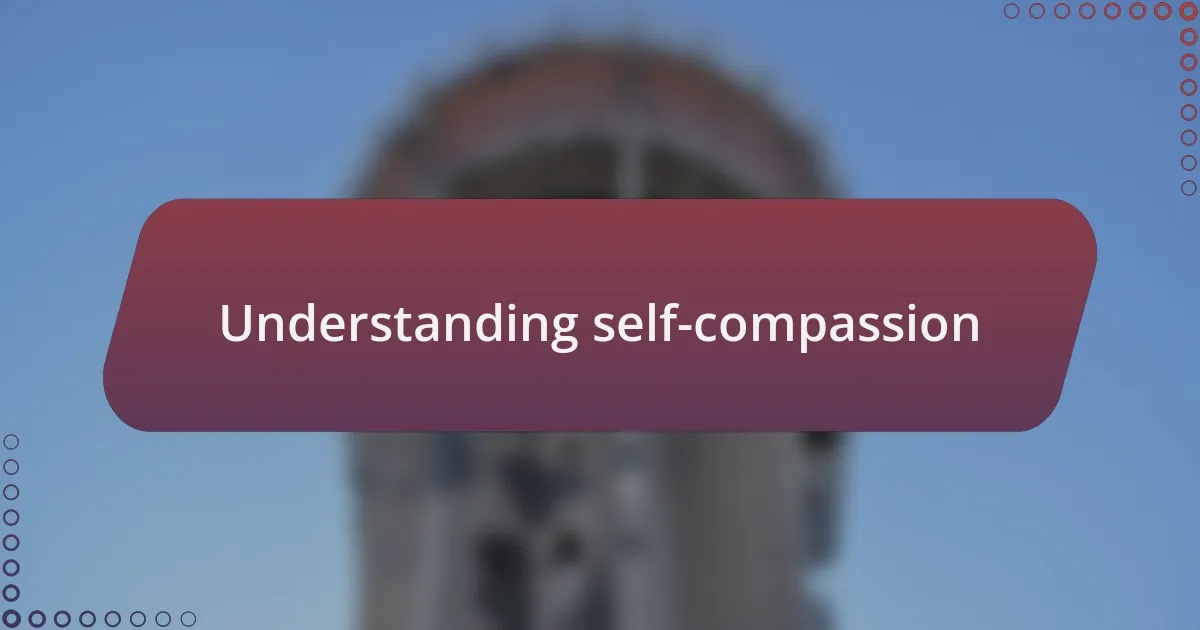
Understanding self-compassion
Self-compassion can often feel elusive, yet it’s a crucial part of healing. I remember a time when I was overwhelmed by guilt after a mistake that seemed unforgivable. It was then I realized that treating myself with the same kindness I would offer a friend could be transformative. Why do we find it so easy to be gentle with others but harsh with ourselves?
At its core, self-compassion involves accepting our flaws and recognizing that imperfection is a part of being human. I’ve learned that when I acknowledge my struggles instead of pushing them away, I create space for growth. Isn’t it interesting how allowing ourselves to be vulnerable can lead to greater resilience?
Understanding self-compassion also means embracing a mindset of mindfulness. I found that when I pay attention to my thoughts without judgment, I can separate my identity from my failures. This shift not only brings clarity but allows for a deeper connection with my own emotional experiences. How might your life change if you allowed yourself to feel without fear of judgment?
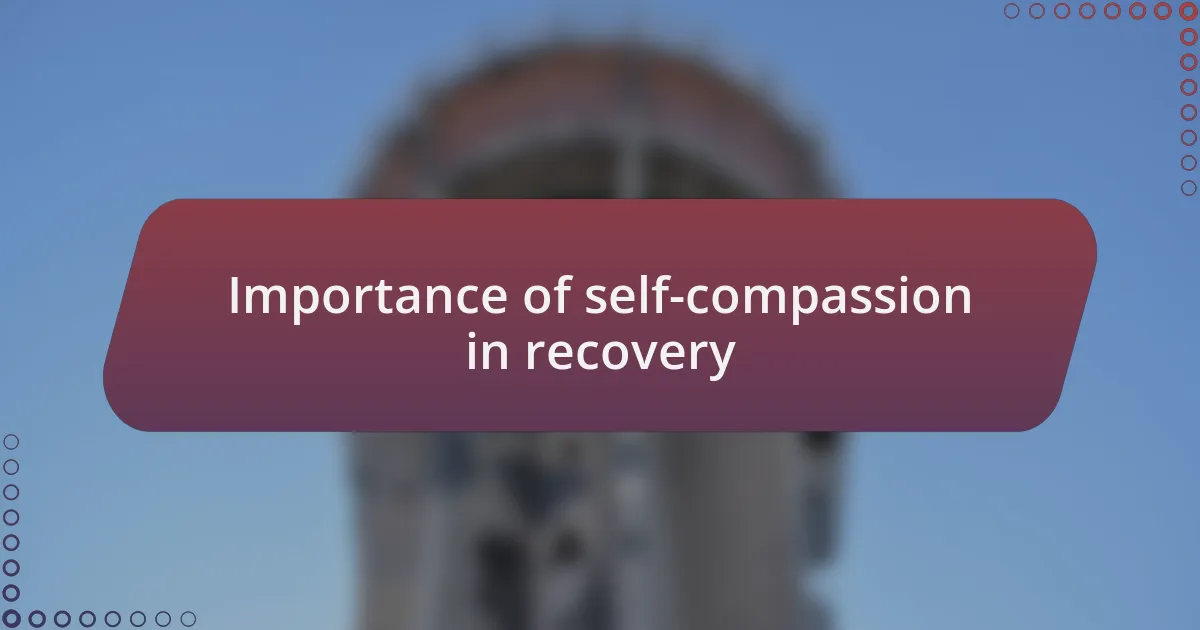
Importance of self-compassion in recovery
Practicing self-compassion during recovery serves as a crucial lifeline. I recall a moment when I struggled with feelings of inadequacy after facing setbacks in my healing journey. It dawned on me that, by honoring my struggles rather than dismissing them, I could embrace the process and recognize that healing isn’t linear. Isn’t it intriguing how we often punish ourselves for not progressing quickly enough, when in reality, every step is valuable?
Moreover, cultivating self-compassion allows us to silence our inner critic. There was a time when I would replay my mistakes endlessly, shrouding myself in shame. However, when I began to speak to myself gently, reframing my thoughts, I noticed a shift. This nurturing approach helped me feel more motivated to confront my challenges instead of retreating from them. Have you ever considered how your self-talk influences your emotional well-being?
Finally, self-compassion fosters a sense of connection, both to ourselves and others. When I began sharing my experiences of vulnerability, I found that I wasn’t alone. This realization not only built my empathy but also strengthened my relationships. By acknowledging my own humanity, I learned to accept others and their struggles more fully. How might our connections transform if we all practiced a little more self-love in our journeys?
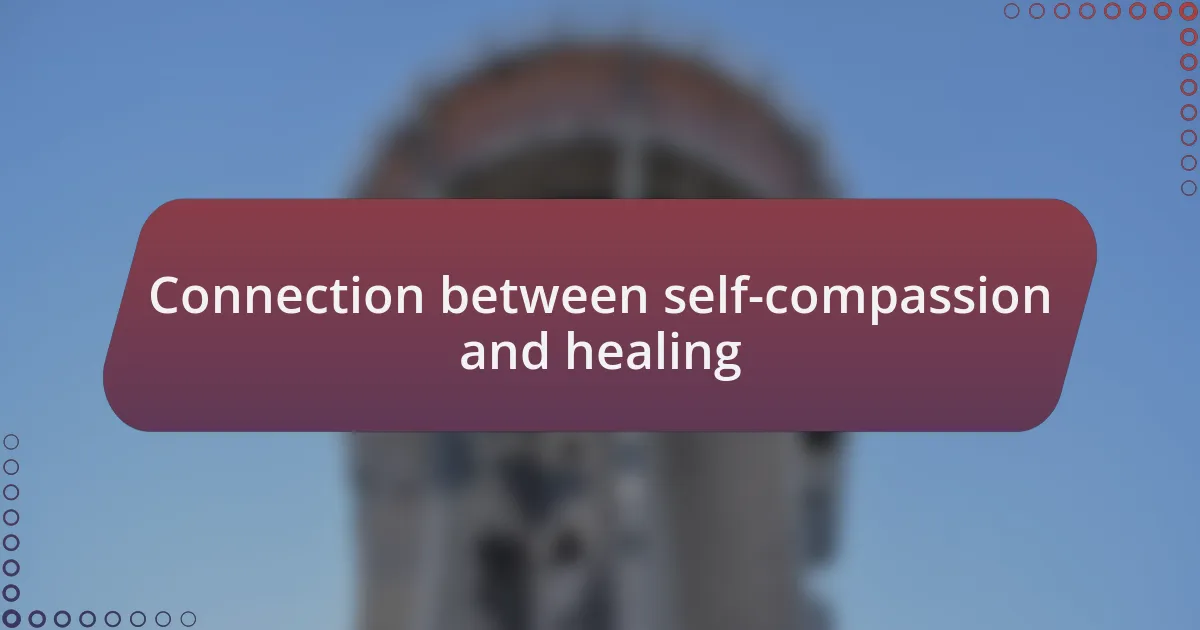
Connection between self-compassion and healing
The connection between self-compassion and healing is profound, as I’ve experienced firsthand. I remember a particularly challenging day when the weight of my past conflicts felt overwhelming. In that moment, instead of berating myself for feeling stuck, I chose to embrace my feelings with kindness. This simple shift transformed my perspective, allowing me to see healing as a journey where every feeling is a necessary part of the process. How often do we allow ourselves to feel without judgment?
As I practiced self-compassion, I noticed a remarkable change in my emotional resilience. It was during a reflective moment, sitting quietly with my thoughts, that I realized my setbacks were not failures but opportunities for growth. The gentle acknowledgment of my pain turned into a source of strength. Have you ever paused to consider how treating yourself with love might empower you to face life’s challenges?
Ultimately, self-compassion nurtures our healing by letting go of the need for perfection. I once believed that to heal, I needed to show only my strongest self. However, it was in the moments of vulnerability—like sharing my fears with a close friend—that I found true healing. This openness created a bond that reminded me, we are resilient together. Isn’t it powerful to think about how our collective journeys can thrive on a foundation of self-acceptance?
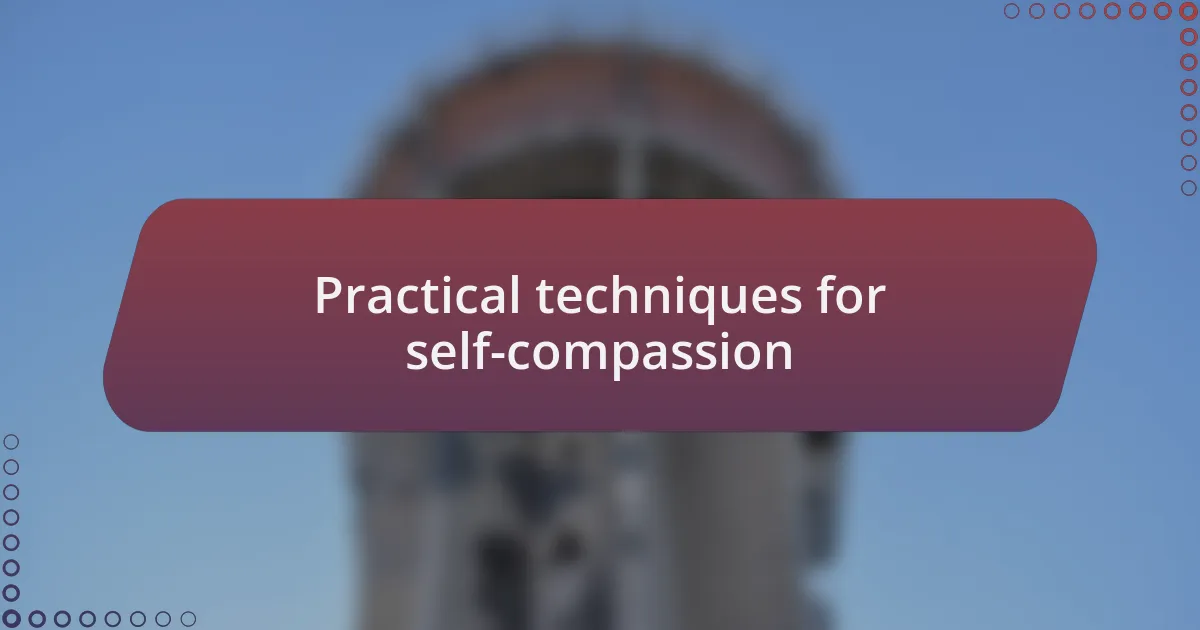
Practical techniques for self-compassion
When I first embraced self-compassion, I began to incorporate a daily practice of mindfulness. Each morning, I carved out a few moments to focus on my breath, allowing myself to acknowledge my feelings without rushing to fix them. During this quiet time, a wave of relief often washed over me, reminding me that it’s okay to simply be in the moment. How often do we grant ourselves that time?
Another effective technique I’ve found is writing a compassionate letter to myself. In these letters, I don’t hold back; I express my struggles and then counter them with words of kindness and understanding. I remember writing one after a particularly long week, where I felt utterly defeated. As I poured my heart into that letter, I could almost feel the heaviness lift, replaced by a gentle warmth. Have you ever tried dialoguing with your own feelings this way?
I also advocate for the power of affirmations. I started saying positive affirmations aloud while looking in the mirror, even when I felt hesitant. Phrases like “I am worthy of love and care” became a mantra that I repeated daily. I must say, there were times I struggled to believe them, but gradually, they shifted my inner dialogue. Can something as simple as a few words really change how you see yourself? The transformative potential is immense if we let it in.
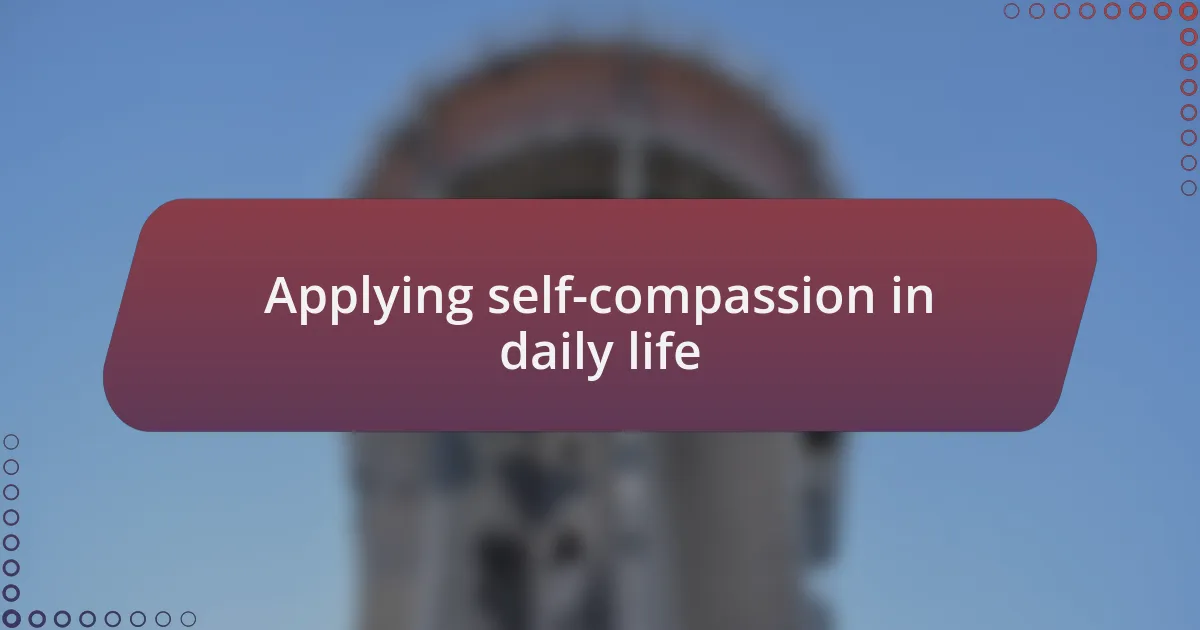
Applying self-compassion in daily life
Incorporating self-compassion into my daily life has often looked like creating gentle reminders in unexpected places. I once placed sticky notes on my bathroom mirror, each bearing a simple phrase like “You’re doing your best.” This small act turned into a daily ritual that prompted me to pause and be kind to myself, especially on mornings when self-doubt crept in. Have you ever taken a moment to recognize your efforts, however small they may seem?
Another way I apply self-compassion is through setting boundaries. I used to over-commit, saying “yes” even when my heart wasn’t in it. By learning to politely decline invitations that didn’t serve me, I rediscovered precious time for self-care. I remember a weekend when I turned down social plans to recharge instead. The result? A renewed sense of peace and a deeper connection with myself. How often do we ignore our needs in favor of pleasing others?
Lastly, I’ve started practicing self-compassionate dialogue during tough moments. When I make a mistake, I consciously remind myself, “It’s okay to be imperfect.” This shift has been life-changing; instead of spiraling into self-criticism, I now treat myself like I would a close friend. Recently, after a project didn’t go as planned, I found myself saying, “This setback doesn’t define you.” It’s a simple but powerful shift—isn’t it liberating to realize that we all deserve a little grace?
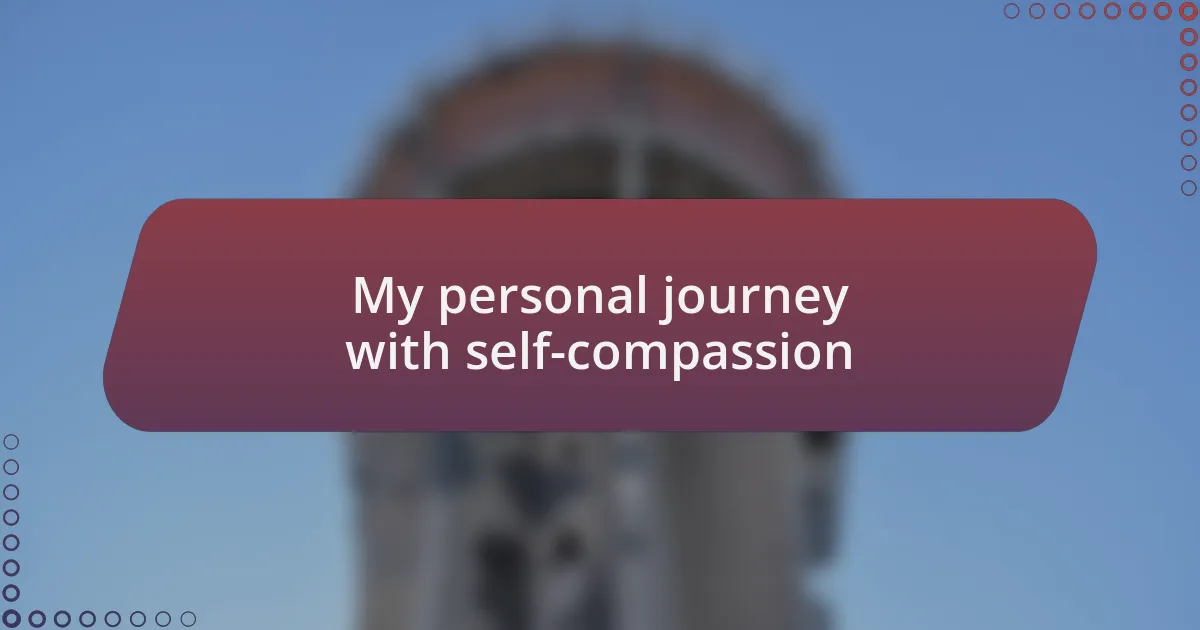
My personal journey with self-compassion
My path to self-compassion has been anything but straightforward. I distinctly remember a time during a challenging period when I found myself overwhelmed by negative thoughts. I was scrolling through social media, comparing my journey to others, and feeling like I was falling short. It was in this moment of despair that I realized the importance of treating myself with the same kindness I would offer a friend. Isn’t it interesting how we often reserve our harshest judgments for ourselves?
There was a particular afternoon when I crashed after a long week—emotionally and physically drained. Instead of succumbing to guilt for taking time off, I wrapped myself in a cozy blanket with a book I had been wanting to read. As I settled into that moment, I felt a wave of acceptance wash over me. Allowing myself that break felt transformative, almost like giving myself permission to simply exist without the weight of expectations. How many times do we deny ourselves that simple pleasure?
Recently, after experiencing a moment of self-doubt regarding my progress, I decided to start a self-compassion journal. Each entry begins with something I appreciate about myself, no matter how trivial it may seem. Writing these things down felt like lifting a burden off my shoulders. It’s a small step, yet it serves as a reminder that my worth isn’t tied to my achievements. Have you ever taken the time to acknowledge your own strengths, even the minor ones? It’s a game changer, isn’t it?
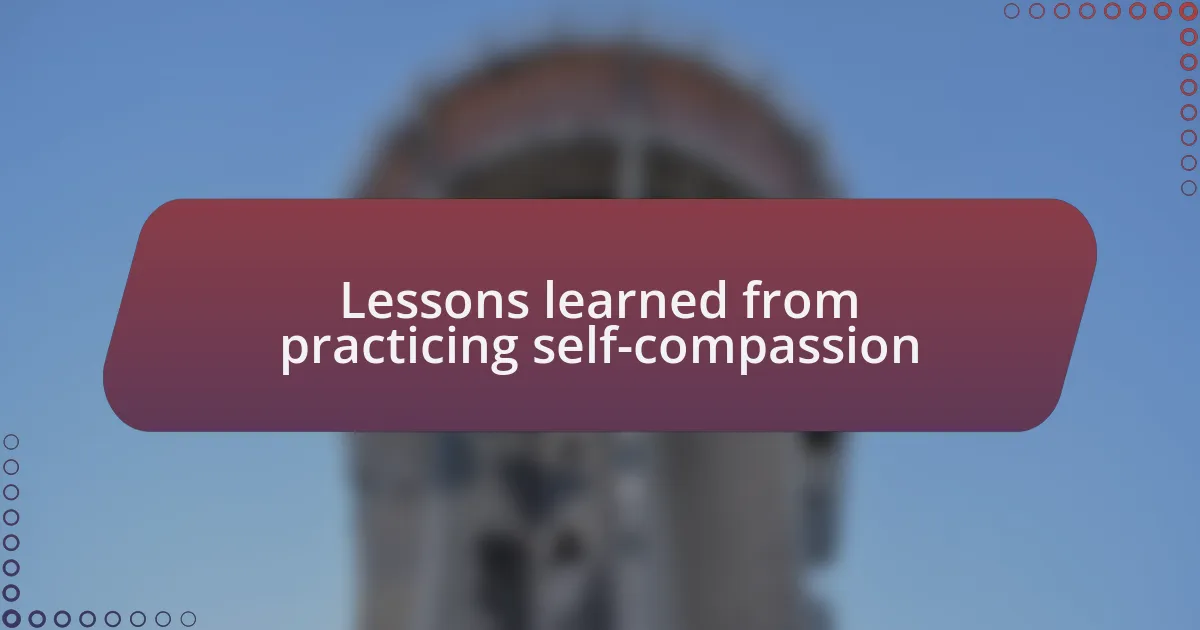
Lessons learned from practicing self-compassion
Practicing self-compassion has taught me that vulnerability can be a strength, not a weakness. I remember a moment when I shared my struggles with a close friend, expecting pity but receiving understanding instead. That exchange opened my eyes to the power of being honest about my feelings, reminding me that everyone has their battles. Have you ever found relief in simply admitting that you’re not okay?
I’ve also learned that self-compassion fosters resilience. There was a time when a setback in my career left me questioning my abilities. Instead of spiraling into self-blame, I took a step back and reminded myself that failure is part of growth. By treating my mistakes with kind curiosity rather than criticism, I discovered new avenues for improvement. Doesn’t it feel empowering to think that setbacks can lead to unexpected opportunities?
Furthermore, I realize that self-compassion nurtures a more positive inner dialogue. In the past, I would often replay negative experiences over and over, allowing them to shape my self-worth. By consciously reframing my thoughts, replacing self-critique with encouragement, I began to create a healthier mental space. Isn’t it fascinating how a simple shift in perspective can change the way we view ourselves?